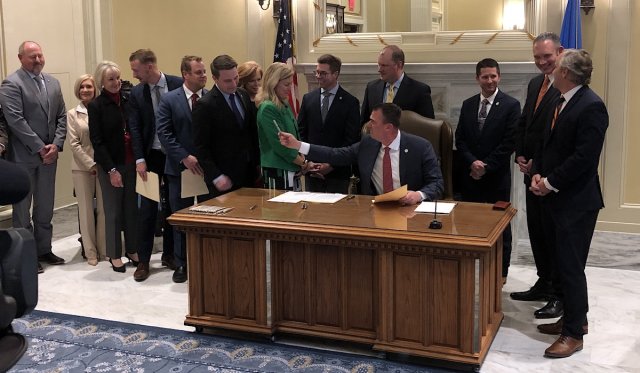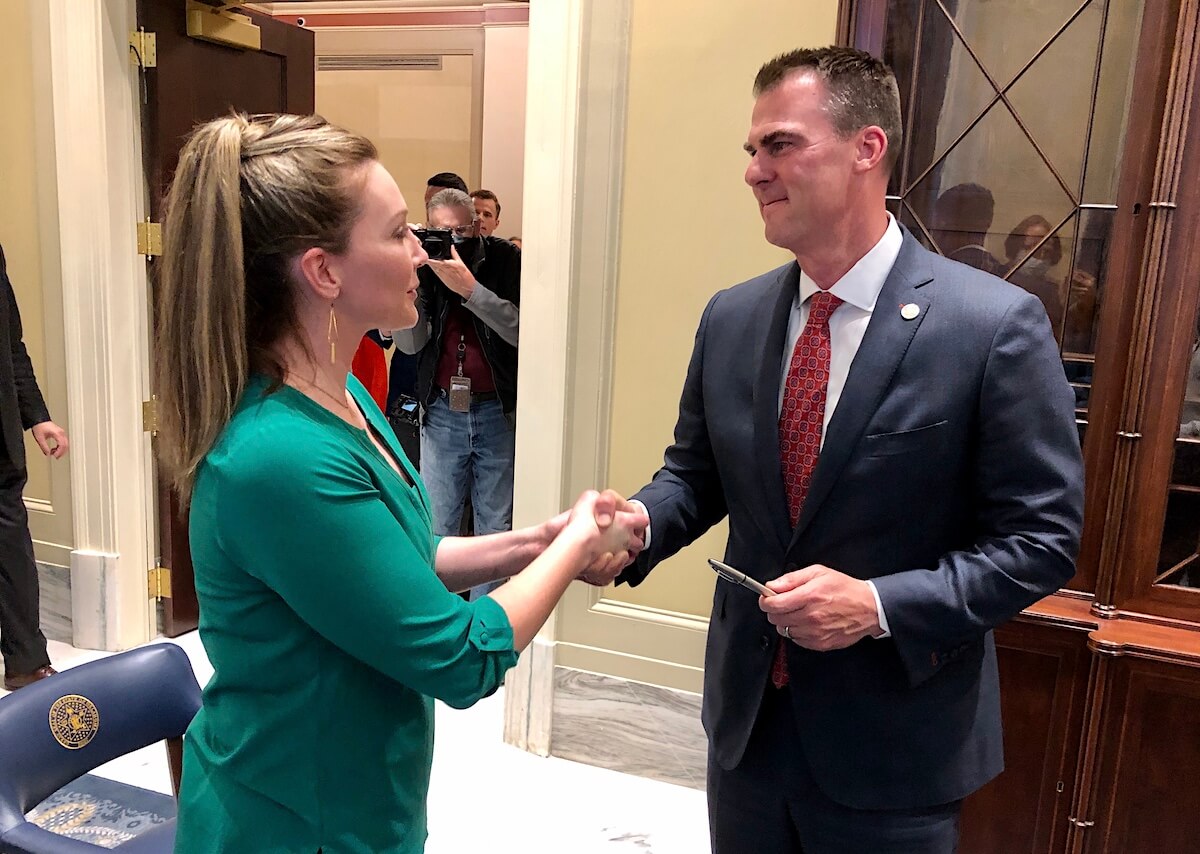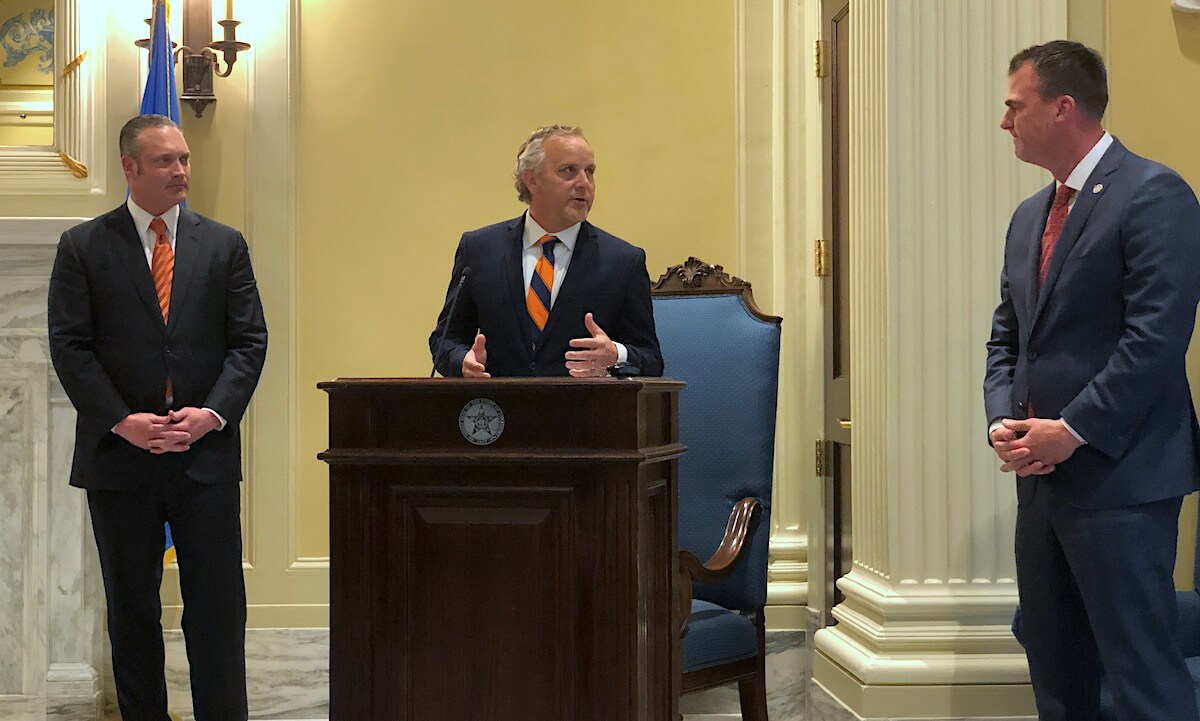

The Oklahoma Legislature sent a pair of significant education reforms to Gov. Kevin Stitt today, which he praised as “transformative” and signed into law within hours of their passage.
HB 2078 and SB 783 passed the Senate and House respectively today despite significant opposition from educators, particularly in rural areas. One bill will adjust the state aid formula in an effort to tie funding more closely to current student enrollment, while the other bill establishes a statewide student transfer policy intended to offer parents greater opportunity to enroll their children in other school districts.
“You know it’s a big day when bills pass off the floor and the governor has them on his desk ready to sign by that afternoon,” said Senate President Pro Tempore Greg Treat (R-OKC). “We truly put parents and students first with the legislation today, and it’s crazy. These are common-sense things that most Oklahomans probably think are already happening — that the money should follow the student more quickly. That people shouldn’t be counted two or three times in the formula to dilute the money for the students in the classroom. These are common-sense reforms, but you can see how monumental it is to get common-sense reform in.”
Stitt referenced his State of the State address when he asked lawmakers to consider the pandemic’s disruption to education as “an opportunity to rethink and reimagine the future of education in the state of Oklahoma.”
“We are truly transforming the way we will educate kids in Oklahoma for future generations,” Stitt said. “During this past year, and especially during the pandemic, I heard from so many parents who felt trapped. All they wanted is the option to send their kids to school in-person. Now, Oklahoma students and parents will never again be denied the chance to go to the school that best fits their needs.”
Lawmakers and the governor heard from one of those parents again Wednesday during the bill-signing ceremony. Kandice Jeske, a mother of two who lives in the Deer Creek Public Schools district, offered appreciation to the assembled lawmakers at the end of their press conference.
“Thank you for investing in education. Thank you for listening to parents,” Jeske said.
Jeske’s 9-year-old child “has a brain condition and he couldn’t do all the virtual work” when Deer Creek schools were closed. As a result, she found a way to enroll her child in a rural Logan County school district that was holding in-person instruction, and she began contacting Stitt’s office and legislators to encourage them to codify a more parent-friendly transfer policy in state law.
Called the Open Transfer Act of 2021, SB 783 by Sen. Adam Pugh (R-Edmond) and Rep. Brad Boles (R-Marlow) will allow students to transfer to a different district in which they do not live anytime during the year as long as the receiving district has capacity. Each school district will be required to monitor its “capacity” and report that figure to the State Department of Education. A student’s transfer would be granted for one year, and the student may continue to attend the school district each school year after with approval from the school district receiving the student. The House did not send SB 783 through a committee hearing, as is typical for most policy bills.
Currently, districts are allowed to have local policies that allow them to object to a student’s transfer to a neighboring district.
“I can go home and I can tell my son that he can stay in his school next year, and that is just as important as what we might hear from an elected official,” Jeske said.

Hofmeister: ‘One step forward and two steps back’
Jeske was referring to a journalist’s question about State Superintendent for Public Instruction Joy Hofmeister being absent from the day’s ceremony. Earlier in the afternoon, Hofmeister had released a statement praising the open transfer bill while panning the funding formula changes.
“Today marks one step forward and two steps back for public education. While Senate Bill 783 holds real promise for many families and students, House Bill 2078 unfortunately compromises any gains that would come with open transfers,” Hofmeister said. “Children in rural Oklahoma deserve to have a high quality education, and HB 2078 potentially jeopardizes that. This bill removes financial safeguards meant to protect all students from the impact of abrupt changes in the local economy. Kids will lose when schools are forced to make sudden cuts in essential services and opportunities which provide access to a well-rounded education.”
HB 2078 will alter how school districts receive state-allocated aid beginning with the 2022-2023 school year. Carried by House Appropriations and Budget Committee Vice Chairman Kyle Hilbert (R-Depew) and Sen. Zach Taylor (R-Seminole), the bill will scrap the current three-year enrollment high used to determine per-pupil state aid for schools. Instead, funding for districts will be based on either the current year’s initial enrollment numbers or the previous year’s enrollment, whichever is higher. The December calculation for funding, called the midyear adjustment, would be based on enrollment totals for the first nine weeks of the current school year or the previous school year, whichever is higher.
“With the funding mechanism, we ensure that those dollars follow that student quicker and that the schools that are educating our students receive the compensation,” said House Speaker Charles McCall (R-Atoka). “The challenge with great policy in the state is finding policy that works everywhere in the state of Oklahoma. In my remarks this year to the House of Representatives, I said that is what we are going to focus on: making sure that we have policy that works everywhere, for students and parents regardless of where they live in rural Oklahoma, suburban Oklahoma or urban Oklahoma. And the culmination of these two pieces of legislation fall right into that vein. With open transfer, whether you live in rural Oklahoma or in an urban or suxbubardn area, you have policy that empowers parents to find the right school, the right fit and the best outcome in their opinion.”
Several rural lawmakers and urban Democrats were not convinced that HB 2078 is “great policy” for the entire state, and the bill only passed the Senate by three votes, 27-19.
“At a time when we are still battling the COVID-19 pandemic and school districts are transitioning back to safe in-school instruction, this legislation will result in hundreds of districts losing millions of dollars in state funding,” said Senate Minority Leader Kay Floyd (D-OKC). “Schools will be forced to lay off teachers and staff and cut resources for students. The biggest impact will be in Oklahoma City, Tulsa, and in rural communities. Drastic changes to the funding formula will be disruptive to a stable learning environment and will have negative effects on students’ ability to learn.”
Oklahoma Education Association President Alicia Priest also issued a statement opposing the bill.
“The quick passage of HB 2078 and Gov. Stitt’s subsequent signing of the bill is disappointing,” she said. “It is disappointing because no school district — rural, urban, or suburban — requested nor advocated for this bill. The changes caused by the passage of this bill will especially hurt our urban and rural schools. During the debate, lawmakers who spoke in support of the bill talked about funding following the child. We know that it already does. That’s what our funding formula was set up to do and has done for years.”
McCall, Treat discuss charter school funding question

The two bills signed into law Wednesday are not the only substantial education change on the horizon in Oklahoma. The State Board of Education voted 4-3 last week to pass a resolution stating that public charter schools should receive the same funding as traditional public schools, but questions abound over if and how local funding sources will be allocated to charter schools, including virtual entities like Epic Charter Schools.
Asked whether they are considering legislation in the wake of the state board’s resolution, McCall and Treat said they are having conversations.
“We are looking at that action. We are not completely sure that we have all the information,” McCall said. “But that is something that we are taking a look at in the House and will weigh appropriately, and so I think you will continue to hear more about that in the next weeks coming.”
Treat said members of the Senate Republican Caucus are “digging in” on the topic.
“We are diligently reviewing it. There are differences between various charter schools,” Treat said. “Many charter schools have a brick-and-mortar presence, and it makes sense to treat kids equally. Where you have virtual and a true virtual setting, we need to contemplate, ‘Should they get the same treatment on ad valorem and transportation (funding)?’ My personal opinion is that we should separate out between virtual charter schools and the more traditional model of brick-and mortar.”




















